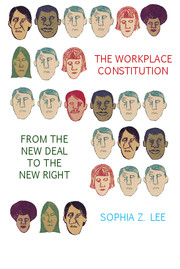Book contents
- Frontmatter
- Contents
- Acknowledgments
- Introduction
- Part I Crafting the Workplace Constitution in the New Deal 1930s and 1940s
- Part II Advancing the Workplace Constitution in the Cold War 1950s
- Part III Administering the Liberal Workplace Constitution in the Long 1960s
- Part IV The Workplace Constitution in the New Right 1970s and 1980s
- 10 Conservatives Reject the Liberal Workplace Constitution
- 11 Liberals Rethink the Workplace Constitution
- 12 Conservatives Unite the Workplace Constitutions
- 13 The Conservative Workplace Constitution Divides the New Right Coalition
- Epilogue
- Appendix: Figures
- Notes
- Selected Bibliography of Primary Sources
- Index
12 - Conservatives Unite the Workplace Constitutions
Published online by Cambridge University Press: 05 October 2014
- Frontmatter
- Contents
- Acknowledgments
- Introduction
- Part I Crafting the Workplace Constitution in the New Deal 1930s and 1940s
- Part II Advancing the Workplace Constitution in the Cold War 1950s
- Part III Administering the Liberal Workplace Constitution in the Long 1960s
- Part IV The Workplace Constitution in the New Right 1970s and 1980s
- 10 Conservatives Reject the Liberal Workplace Constitution
- 11 Liberals Rethink the Workplace Constitution
- 12 Conservatives Unite the Workplace Constitutions
- 13 The Conservative Workplace Constitution Divides the New Right Coalition
- Epilogue
- Appendix: Figures
- Notes
- Selected Bibliography of Primary Sources
- Index
Summary
“The best hope for outlawing compulsory unionism”
Everett DirksenAn “all Negro political party when first presented sounds very ridiculous, doesn’t it?” Ernest Smith asked in January 1964. “But,” he insisted, “we will begin to see that this is one of the most profound ideas that Negroes have had for their own salvation.” In the 1940s, Smith had been a field organizer for the Cannery Workers, the interracial CIO union that organized Larus & Brother’s tobacco plant. Now Smith was teaching at Detroit’s Cody High School and was the campaign coordinator for the local Freedom Now Party. This new party was a vehicle for “all-black political action” in the spirit of contemporaneous movements toppling white colonial rule in Africa. Party leaders urged African Americans “to take our freedom” because “one hundred years of waiting for Democratic and Republican politicians to correct our grievances is too long.” They supported black candidates and promoted “self-reliance,” not revolution. Smith declared that no one “in his right mind could argue against the ideal of integration and equality.” Nonetheless, he had abandoned the Cannery Workers’ fight for interracial class solidarity. Because “the white majority does not favor integration,” he explained, African Americans’ “only salvation is to build and nourish our own institutions.”
Since the 1930s, African Americans outside the South had voted ever more reliably for Democratic candidates, making many worry that the party took them for granted. The Freedom Now Party wanted to elect black candidates, but it also hoped to increase African Americans’ influence within the existing parties. “What would happen to the Democratic party,” Smith asked, “if they woke up one bright November morn and found that the Negro vote was no longer in their hip pocket?” What if, he continued, the Republican Party “started winning elections because the Democrats no longer had the Negro vote?” If both parties started “seriously vying with each other for the Negro vote through ‘The Freedom Now Party,’” Smith argued, the Democratic Party would fight for African Americans’ interests far more vigorously.
- Type
- Chapter
- Information
- The Workplace Constitution from the New Deal to the New Right , pp. 223 - 237Publisher: Cambridge University PressPrint publication year: 2014



